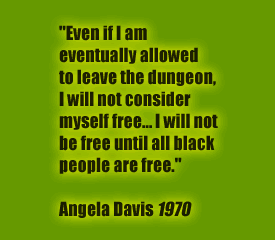|
|

The Black Power Rebellion
TOPICS >>>
Meredith March in Mississippi, Summer,
1966
the call for Black Power by Stokely Carmichael, SNCC
Carmichael and C.V. Hamilton, Black Power, 1967
Black Athletes protest at 1968 Olympic Games
Black Power
The Renaissance of Black Nationalism:
Communist Party: Black Belt
Nation Thesis
Du Bois's "Nation in a Nation"-1935
Nation of Islam: W.D. Fard-- founder
Elijah Poole: Elijah Muhammad "Messenger of Allah"
Malcolm Little/ Malcolm X, 1925-1965 National Spokesman for NOI
Fruit of Islam; University of Islam; network of businesses
Wallace D. Muhammad, Louis Walcott/Louis Farrakhan
Muhammad Speaks newspaper
self help; racial pride; extreme separatism; Booker T. Washington-style
economic program; patriarchy; strict hierarchy
Malcolm X:
Slack revolutionary nationalism,
1964-1965
advocates political independence from DP and GOP
moves from capitalism to socialism
attitude about white alliances changes
Assassination on 21 February 1965 at the Audubon Ballroom
Responses to Malcolm's death:
Carl Rowan, Elijah Muhammad,
Louis Farrakhan
What is "Black Power"?
Rejection of goal of integration/cultural
assimilation
rejection of the philosophy of nonviolence in favor of interest-group
politics
Blacks need their own political organization
rejection of the ideology of liberalism
the parallel's between the Third World colonies
and the racial minorities of the U.S.
CORE:
The impact of Black Power on
an organization
James Farmer, subsequently named Sec. of Housing and Urban Development
Floyd McKissick, North Carolina lawyer, becomes leader, 1966
By 1968-- three-way splintering
revolutionary nationalists like Robert Carson, Brooklyn CORE
conservative nationalists, Roy Innis, Harlem CORE
pragmatic nationalists: McKissick
Chronology of Black Power:
1966,
May -- Adam Clayton Powell, Jr.'s Howard Univ. "Black Power"
speech
June-- Carmichael at Meredith March, calls for Black Power
July-- Wilkins, NAACP denounce Black Power as "reverse racism"
September-- First Black Power Conference, Wash. D.C.
1967--
Black elected officials win mayoral races--Richard Hatcher in Gary, IN,
and Carl Stokes in Cleveland
1967--
Ron (Maulana) Karenga, Kwanzaa festival;
the development of "Cultural Nationalism", principles of Kawaida;
popularity of Swahili; clothing; hair styles; names; changes in music
and popular culture
Imamu Amiri Baraka: major cultural nationalist intellectual/artist
Don L. Lee (Haki Madhubuti): Third World Press, IPE
1966 October--
Establishment of the Black Panther Party for Self Defense by Huey P. Newton
and Bobby Seale, Oakland, CA
1967-l969--
FBI, Cointelpro establish the BPP as the "greatest internal threat" in
the US;
destablization between Karenga's US and BPP
1968--
Detroit; Dodge Revolutionary Union Movement (DRUM)
Elrod Avenue Rev. Union Movement (ELRUM); Ford (FRUM), etc.
1969--
League of Revolutionary Black Workers,
James Foreman, General Baker, Ken Cockrel
Impact of Black Nationalism/Militancy on King:
1966--
leads unsuccessful desegregation campaign in Cicero, IL
1967--
denounces War in Vietnam and Johnson Administration calls for "Poor People's
Movement"
1968--
denounces "excessive anti-Communism"; favors democratic
transformation of US economy; mobilizes sanitation workers in Memphis
Assassination: 4 April 1968:
l30 cities rioted, 39 killed, $130 million property damage in the King
riots;
fed. troops surrounded the capitol building for the first time since the
Civil War
l969-70--
Widespread suppression, destruction of the BPP; murders of Mark Clark,
Fred Hampton in Chicago
1970--
Baraka creates the Congress of Afrikan People (CAP)
197l--
Congressional Black Caucus established
197l-- Baraka
as central theoretician of Black Nationalism--call for World African Party;
Pan-Africanism; calls for a National Black Political Assembly
1972 March--
Gary Convention: the High point of Black Nationalism
Conflicting interpretations of Black Power Politics: Richard Hatcher
Tensions in the National Black Political Assembly, 1972-1976
Development and ideological conflicts in the African Liberation
Support Committee (ALSC), ALD events
Parallels: Liberation struggles
in Guine-Bissau, Angola, Mozambique, Tanzania, and South Africa;
influence of Amilcar Cabral, Agostinho Neto, Eduardo Mondlane, Julius
Nyerere, Michael Manley of Jamaica on US Blacks
PERSONALITIES >>>
Fred Hampton
Amiri Baraka
Huey P. Newton
Angela Davis
Muhammad Ali
Malcolm X:
Factors which made him increasingly
militant/radical rather an a religious, conservative nationalist
"Chickens Come Home to Roost", November, 1963
Malcolm "Silenced"-December,
1963;
leaves NOI in March, 1964
Muslim Mosque Inc.-March, 1964;
Organization of Afro-American
Unity in May, 1964
Key Ideas-- Black
revolutionary nationalism; Pan-Africanism;
internationalism and Third World revolutions; socialism; open to coalitions
with radical/progressive whites after black unity is achieved; critical
of Democratic Party;
need to construct a broad black united front.
Assassination-February 1965:
Legacy after death larger than in life
READINGS >>>
Giddings, When
and Where I Enter, Chapter
XVI, pp. 277-297.
Marable, Race,
Reform and Rebellion, Chapter
V, "Black Power, 1965-1970," pp. 86-113.
Marable and Mullings, eds.,
Let Nobody Turn Us Around, Section
Four, Numbers 17-24, pp. 468-508.
MULTIMEDIA >>>
Music:
Aretha Franklin - "Respect"
(1967)
James Brown - "Say
It Loud, I'm Black and I'm Proud" (1969)
Jimi Hendrix - "Star
Spangled Banner" (1969)
Edwin Starr, "War"
(1970)
Last Poets - "Niggas
Are Scared of Revolution" (1970)
Gill Scott-Heron - "The
Revolution Will Not Be Televised" (1971)
Marvin Gaye - "What's
Goin' On" (1971)
Speeches:
Malcolm X - "White
Man's Disease"
Malcolm X - "The
Ballot or the Bullet"
Films: Clips of speeches
by Stokely Carmichael, Angela Y. Davis, Huey P. Newton,
Bobby Seale, H. Rap Brown, Black Panther Party, etc. and from Mario Van
Peeble's Panther.
Clips from riots following the assassination of M.L. King, Jr., 1968.
Film clips of Malcolm X in last year, 1964-65 and from Spike Lee's X.
Last major speech by M.L. King, Jr., "Been To The Mountaintop." Memphis,
TN., April 3, 1968 film clip.
Clips of black soldiers in Vietnam.
Clip of Attica Prison revolt, 1971.
|










